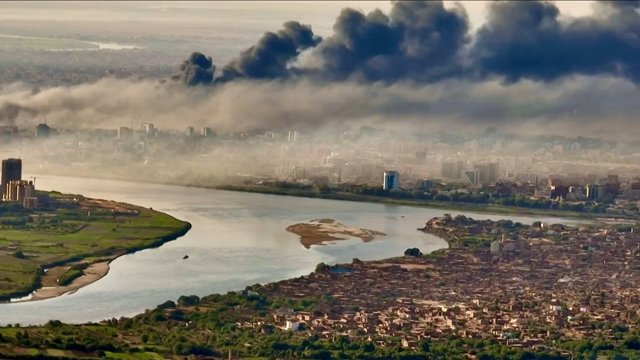You are here
Sudan's Daglo, feared Darfuri general fighting for power
By AFP - Apr 17,2023 - Last updated at Apr 17,2023
KHARTOUM — Feared Sudanese paramilitary commander Mohamed Hamdan Daglo went from a militia chief in war-torn Darfur to the country's second-in-command — to now battling the regular army for control of the country.
Daglo, leader of the large and heavily-armed paramilitary Rapid Support Forces (RSF), collaborated with his now arch-rival, army chief Abdel Fattah Al Burhan, in a 2021 military coup that derailed a transition to civilian rule following the 2019 ouster of hardline president Omar Al Bashir.
Often dressed in desert fatigues, the tall and slightly stooped Daglo — widely known by his nickname Hemeti, short for Mohamed — has crafted a distinct image for himself and his troops, positioning the RSF as autonomous from the military.
An experienced battlefield commander, he has in recent months also deployed a savvy use of social media with posts on Facebook, Instagram and TikTok to address the country's overwhelmingly young population, with two thirds of Sudanese aged under 30.
Darfur upstart to statesman
Born in around 1975, a camel and sheep trader with little formal education, he rose to prominence when Khartoum's hardline government under Bashir began arming nomadic Arab raiders to counter an ethnic minority rebellion that broke out in the western Darfur region in 2003.
The groups known as Janjaweed were sent to attack villages on camel and horseback as part of a campaign of terror that saw Bashir indicted for war crimes, crimes against humanity and genocide by the International Criminal Court.
The war in Darfur left hundreds of thousands dead and more than two million displaced.
By 2013, Bashir had appointed him commander of a new force made up of former, mostly Arab, militiamen as Khartoum once again sought to crush the insurgency — the RSF.
But many in Khartoum looked down at the rise of the Darfuri, who hails from the Arab Rizeigat people.
"The old guard, dominated by the old Sudanese elite around Khartoum, very much view Hemeti as an illiterate, upstart thug whom they first armed to do their dirty work in the war in Darfur," said Alan Boswell, Horn of Africa director at the International Crisis Group.
Closer to power
For nearly a decade, Daglo used his reputation as a ruthless militiaman and street-smart leader to maneuver his way closer to power, all the while growing richer off lucrative RSF-controlled gold mines.
The RSF were deployed in Yemen when Sudan joined the Saudi-led coalition fighting in the civil war there in 2015, in what proved a major boon for both Daglo and his future coup partner, army chief Abdel Fattah Al Burhan.
"It allowed him, alongside Burhan, to meet United Arab Emirates officials and Saudi officials and present themselves as possible successors of Bashir," researcher Jerome Tubiana said.
According to experts, the force has also been involved in the conflict in neighbouring Libya.
When the military toppled Bashir in 2019, Daglo became the second most powerful man in the country, but accusations of RSF atrocities continued in the ensuing security crackdown.
When security personnel attacked pro-democracy demonstrators camped out in the heart of the capital in June 2019, it was the RSF that witnesses said were at the forefront of the bloodshed, killing at least 128 people.
Political ambitions
His sights were set still higher, and experts warned he was a man with massive forces at his disposal and lofty political ambitions, whose actions should be closely watched.
Since the coup, Daglo's power has only grown, as he sought to craft a more palatable image — working on his heavily-accented Arabic, for instance — while building key alliances.
Though experts have long drawn links between the RSF and Russian mercenary group Wagner, Daglo gained new access as second-in-command, landing in Moscow the day after its invasion of Ukraine.
As the rift with Burhan grew, Daglo came to call the coup he had helped lead a "mistake" that had failed to bring about change and invigorated remnants of Bashir's Islamist regime.
After battles erupted on Saturday — with fighting still raging through densely-populated streets of Khartoum — Daglo has portrayed himself and the RSF on social media and international TV as the saviours of Sudan.
In regular posts in both Arabic and English, the RSF claim to be safeguarding democracy against "the putschist forces" led by Burhan, who Daglo slammed as a "criminal" and "a radical Islamist".
In turn, Burhan has called Daglo a "criminal" and the RSF a "rebel militia".
Related Articles
KHARTOUM — Sixteen months since Sudan’s top generals ousted a transition to civilian rule, the coup leaders are embroiled in a dangerous pow
KHARTOUM — Sudan's army chief Abdel Fattah al-Burhan called on troops Sunday to "end" support for authoritarian leaders as talks begin on mi
KHARTOUM — Explosions and gunfire resounded in Sudan's capital Thursday as fighting between the forces of two rival generals showed no signs


















